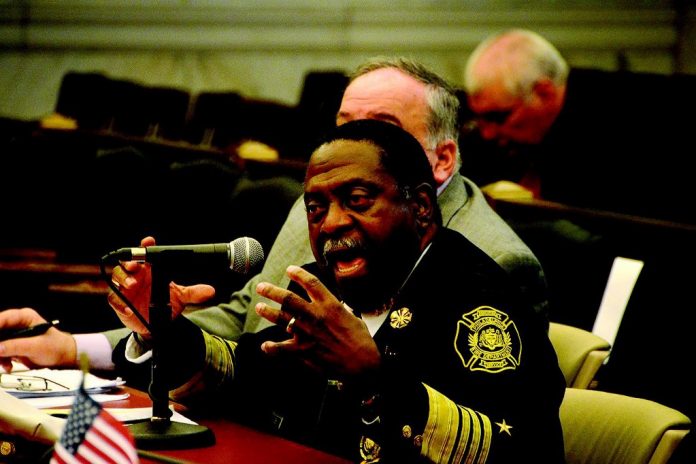Words of defense: Fire Commissioner Lloyd Ayers responds to questions from City Council members about his department’s operations. MARIA POUCHNIKOVA / TIMES PHOTOS
Six minutes.
That’s how long it took Philadelphia Fire Commissioner Lloyd Ayers and his aides to calculate a response to one specific question by City Councilman Mark Squilla during a City Hall budget hearing last Wednesday.
Squilla, who represents South Philly and the River Wards, wanted to know how many vacant officer positions there are in the fire department — that is, how many unfilled lieutenant, captain, battalion chief and deputy chief jobs.
Ayers, who had already fielded a litany of inquiries about staffing, training and overtime expenditures, did not know the number that Squilla sought. The commissioner paused, then consulted one of his deputies.
“We’ll have it for you in a minute,” Ayers said.
What followed was a dialogue that highlighted what other Council members later described as a frustrating lack of transparency in the fire department’s operations and, similarly, in the Nutter administration’s refusal to implement a labor contract awarded to firefighters through arbitration.
“They’re saying that they make the decisions and they’re not going to tell you what their methodology is because they want to make the decisions. That’s not acceptable,” said at-large Councilman Dennis O’Brien.
“You have a binding arbitration award — fund it. You have vacancies — fill them. And you have professional training that’s not happening. Fix them.”
Ayers ultimately informed Squilla that there would be 32 officer vacancies in the fire department by June, including 14 lieutenants, seven captains, eight battalion chiefs and three deputy chiefs. Meanwhile, the department continues to reel from the on-duty deaths of Capt. Michael Goodwin on April 6, as well as Lt. Robert Neary and Firefighter Daniel Sweeney on April 9, 2012.
The department has lists of approved and qualified candidates for those jobs. Yet, Ayers said, he’s determined that the lists are too old or “stale” and should be reconstituted via new promotional testing. The new lists wouldn’t be ready until July or August, possibly September.
Squilla called for a better explanation.
“What is the reason we are not filling these vacancies?” he asked. “You have a list, what do you need a testing process for? You have a list of people.”
Ayers replied: “We have a testing process in place and as soon as that testing process is complete, we’ll complete filling out the rest of the vacancies or any more vacancies that occur.”
Squilla didn’t understand the response.
“Does that make any sense to anybody here?” he said, before concluding, “That’s very scary to us and I think to most of the public. We have all these vacancies and we’re going to make a new test?”
Councilman Brian O’Neill of the Far Northeast was similarly stupefied by the responses he got when he asked Ayers to explain why the fire department spent $7.2 million extra in overtime last year, beyond what had been approved in the operating budget. The department’s fiscal 2013 budget was about $218.5 million. It’s requesting $219.1 million for 2014.
Ayers said overtime spending was higher because the department didn’t hire new firefighters as soon as it had planned. A new Fire Academy class was delayed for several months, so those new hires were not available for duty as soon as expected.
“Is this a normal range of being over [budget]?” O’Neill asked.
“No, it’s not,” Ayers replied, before itemizing other factors that contributed to overtime cost overruns. “It’s a myriad of things: injuries, sickness, long-term sickness, all of those things. … There was a new protocol where we had to extend training for another week for cadets.”
“Can you get us a list of those items?” O’Neill said.
The conversation shifted before Ayers acknowledged that request.
At a different stage of the hearing, O’Brien complained that he’s been waiting six months for the department to fulfill several of his requests for information. Specifically, he wants to know why the department has not conducted training classes for lieutenants and captains since 2007. He also wants to know what the department spent on training last year.
The department claims that firefighters trained for more than 317,000 hours last year, but it has been unable to produce a cost analysis, O’Brien said.
At-large Councilman David Oh queried Ayers about another hot-button topic, brown-outs. That’s the controversial program where the department shuts down selected companies temporarily on a rotating basis. Ayers said the program saves the city $3.8 million per year, but that savings is credited to the general fund. It doesn’t go back to fire department operations.
“Do you believe that the brown-outs should continue?” Oh asked.
“If I could have the brown-outs discontinued, I would discontinue them. Right now … they’re contributing to the budget and the safety of the citizens has not been diminished,” Ayers said. •
The fire commissioner said it would be the Nutter administration’s decision to provide funding for the elimination of brown-outs. ••
On the Web:
For video clips from the Philadelphia Fire Department budget hearing at City Council, visit the Northeast Times YouTube channel at www.youtube.com/user/NortheastTimes
Reporter William Kenny can be reached at 215–354–3031 or [email protected]





